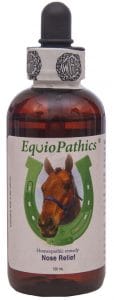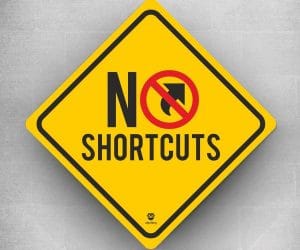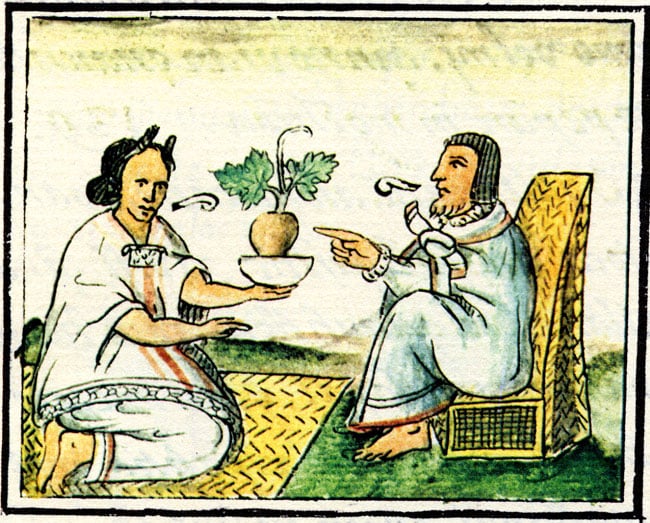 If you look through any horse periodical, or get any horse-related catalog, or if you listen to just about anyone talking about horses and horse health, you may have noticed that there are lots of products and services that allege that they can help you prevent, well, just about anything.
If you look through any horse periodical, or get any horse-related catalog, or if you listen to just about anyone talking about horses and horse health, you may have noticed that there are lots of products and services that allege that they can help you prevent, well, just about anything.
The time-worn adage is, “An ounce of prevention is worth a pound of cure,” said by none other than the esteemed Dr. Benjamin Franklin. And while Dr. Franklin undoubtedly was thinking in the right direction, the adage doesn’t necessarily multiply well. That is, a pound of prevention is not necessarily worth 16 pounds of cure (and so on – an ounce is 1/16 of a pound, if you want to check the math). However, more preventive medicine is not necessarily better preventive medicine: and it can be really expensive.
There are more than just a few things that you can allegedly prevent, at least if you’re one of  those folks that believe everything that you read and hear. Here goes: Infectious diseases, Internal parasites, External parasites, Weight loss, Tooth problems, Arthritis, Digestive issues, Hoof problems, Vitamin/mineral deficiencies, Pain, Gastric Ulcers, Bad behavior, Amino Acid Deficiencies, Respiratory Problems, Colic, Sand accumulation, Skin problems, Nose problems…
those folks that believe everything that you read and hear. Here goes: Infectious diseases, Internal parasites, External parasites, Weight loss, Tooth problems, Arthritis, Digestive issues, Hoof problems, Vitamin/mineral deficiencies, Pain, Gastric Ulcers, Bad behavior, Amino Acid Deficiencies, Respiratory Problems, Colic, Sand accumulation, Skin problems, Nose problems…
Yes, nose problems.
Still, when it comes to preventive medicine, there are two important facts.
- You can’t prevent everything.
- If you try to prevent everything, you’ll go broke. This assumes that you’re not a billionaire, of course. However, even if you are a billionaire, see fact #1.
To a certain extent, preventive stuff may help prevent some anxiety in some folks, but that’s another thing entirely. In such cases, that discussion gets into questions like, “What, exactly, are you trying to prevent?” and, “In whom are you trying to prevent stuff anyway?”
 To help you sort through this preventive morass (to prevent problems associated with preventive medicine, as it were), I’ve come up with four rules for you to consider before adopting anything sort of “preventive” measures.
To help you sort through this preventive morass (to prevent problems associated with preventive medicine, as it were), I’ve come up with four rules for you to consider before adopting anything sort of “preventive” measures.
- RULE #1 – Use products or services that have been shown to be effective by some objective means (e.g., a good scientific study). As much as you cherish the opinion of best friend’s Uncle Al who grew up around horses 40 years ago, you really do want to look for some sort of objective measurement behind preventive products.
- RULE #2 – Use products or services that contain what they say they contain
- RULE #3 – Don’t use preventive medicine unless you need to use the medicine
- RULE #4 – Consider effective things you can do that don’t need medicine
With that intro, and with the fact that one article addressing everything that you might want to prevent might end up being a long novel, let’s start by looking at vaccines.
PREVENTING INFECTIOUS DISEASES BY VACCINATION
 Like all living creatures, horses get sick from infectious diseases on occasion – caused by viruses, bacteria, fungi, and the like – thus, trying to prevent infectious diseases is a big focus of equine medicine. One of the most common tools for doing this, of course, is a vaccine.
Like all living creatures, horses get sick from infectious diseases on occasion – caused by viruses, bacteria, fungi, and the like – thus, trying to prevent infectious diseases is a big focus of equine medicine. One of the most common tools for doing this, of course, is a vaccine.
There are four main ways that horses can get an infectious disease:
- Horse to horse spread (think kids in school),
- Contact with an infectious agent in the environment (e.g., nasal discharge smeared on a watering trough by a sick horse, or on your shirt sleeve),
- By introduction from objects (e,g., tetanus)
- From living carriers (e.g., mosquitoes) that infect horses with diseases such as West Nile Virus, or one of a variety of viral encephalitis conditions. Of course, other insects cause horses problems, too, especially ticks, and a whole host of flies. Oh, and don’t forget about the various mammals that can transmit rabies (in some areas). It’s always something.
Since vaccination is a commonly prescribed tool for preventing infectious diseases, let’s see how the four rules apply.
RULE #1 – Use products or services that have been shown to be effective
 There are a few equine vaccines that are pretty effective. These include tetanus, rabies, West Nile Virus vaccine, and viral encephalitis vaccines. Tetanus vaccination probably lasts 5 or 10 years, but it tends to be given every year or so for, as near as I can tell, 1) It’s included in a lot of different vaccines, and 2) There seems to be some sort of way overblown concern that the slightest cut will inevitably cause a horse to develop tetanus (in fact, a well-cared for wound shouldn’t really have any problems).
There are a few equine vaccines that are pretty effective. These include tetanus, rabies, West Nile Virus vaccine, and viral encephalitis vaccines. Tetanus vaccination probably lasts 5 or 10 years, but it tends to be given every year or so for, as near as I can tell, 1) It’s included in a lot of different vaccines, and 2) There seems to be some sort of way overblown concern that the slightest cut will inevitably cause a horse to develop tetanus (in fact, a well-cared for wound shouldn’t really have any problems).
Rabies vaccination is effective, and it probably lasts more than one year, but in the United States, it’s use is generally mandated by government authorities in areas where rabies is a problem. You should follow the rules in your area, of course.
On the other hand, quite a number of equine vaccines are most likely NOT very effective when it comes to preventing diseases. The strangles vaccine in particular does not seem to be very effective; so much not so that it’s pretty much only used in one country in the world (the US). Other vaccines that do not seem to be particularly effective at preventing diseases, or that we really don’t know if they prevent diseases include:
 Influenza vaccine (vaccination might help reduce shedding, or perhaps reduce the severity of infection, but it certainly hasn’t eliminated the disease)
Influenza vaccine (vaccination might help reduce shedding, or perhaps reduce the severity of infection, but it certainly hasn’t eliminated the disease)- Herpes virus vaccine (there’s no vaccine that prevents the neurologic form of herpes virus, by the way)
- Potomac Horse Fever vaccine (it only vaccinates against a couple of last-I-saw nine or so strains of the disease
- Lyme Disease – there’s no horse vaccine. Because Lyme Disease is a real problem in some areas, and because people want to try to prevent their horses from getting it, some horses get vaccinated with a vaccine created for dogs. How well it works is anyone’s guess at this point.
 I know that there’s a Hendra virus vaccine in Australia, and that it’s caused a bunch of controversy, but in my view, since sick horses can transmit Hendra virus to people, and the people who often are on the front lines of seeing sick horses are colleagues and friends, I’m firmly on the side of vaccinating horses in affected areas against Hendra virus. In fact, if I lived Down Under, I don’t think that I’d be enthusiastic at all about going out to check horses with fevers without knowing that the horses had also be vaccinated against the disease, but that’s just me. I know there’s been some controversy, so here’s an article about the vaccine, published in 2017. Worth a read. https://www.ncbi.nlm.nih.gov/pmc/articles/PMC5390447/
I know that there’s a Hendra virus vaccine in Australia, and that it’s caused a bunch of controversy, but in my view, since sick horses can transmit Hendra virus to people, and the people who often are on the front lines of seeing sick horses are colleagues and friends, I’m firmly on the side of vaccinating horses in affected areas against Hendra virus. In fact, if I lived Down Under, I don’t think that I’d be enthusiastic at all about going out to check horses with fevers without knowing that the horses had also be vaccinated against the disease, but that’s just me. I know there’s been some controversy, so here’s an article about the vaccine, published in 2017. Worth a read. https://www.ncbi.nlm.nih.gov/pmc/articles/PMC5390447/
Other vaccines include African Horse Sickness and Botulism, but those are very specific concerns limited to a few areas, and this article is going to be too long already.
 QUICK ASIDE – WHY DO HORSES GET VACCINATED SO OFTEN? Honestly, with only a few exceptions, we don’t really know how well many equine vaccines actually prevent disease. Many equine vaccines produce a fairly limited duration of immunity, as measured by blood levels of immune factors (titers). Thus, some folks may recommend erring on the side of “too much” vaccination in order to try to prevent diseases, which is at least an understandable goal. Remember, in people, there’s a new influenza vaccine every year, too.
QUICK ASIDE – WHY DO HORSES GET VACCINATED SO OFTEN? Honestly, with only a few exceptions, we don’t really know how well many equine vaccines actually prevent disease. Many equine vaccines produce a fairly limited duration of immunity, as measured by blood levels of immune factors (titers). Thus, some folks may recommend erring on the side of “too much” vaccination in order to try to prevent diseases, which is at least an understandable goal. Remember, in people, there’s a new influenza vaccine every year, too.
Effectiveness notwithstanding, vaccination intervals are often determined by outside agencies. So, for example, if you have a horse that competes in United States Equestrian Federation (USEF) or Federation Equestre Internationale (FEI) events, you may have vaccinate your horse every six months, as required by those agencies (or they have to demonstrate a good reason why not). They make the rules and you have to play by them (if you want to play).
RULE #2 – Use products or services that contain what they say they contain
 There are a good number of preventive products out there that have been shown not to contain what they say they contain (supplements are the big culprit here – we’ll have an article on those, later). Fortunately, vaccine manufacture is pretty tightly regulated and controlled, so you can be generally pretty sure that there’s vaccine in your horse’s vaccine and that the vaccine is fairly safe (NOTE: Nothing is 100% safe, and some horses can have reactions). However, it’s important that the vaccines be handled and stored properly, so if you want to get vaccines from somewhere other than your veterinarian, or if you don’t store them properly, you may be assuming some sort of risk that the vaccine may not contain what you think it contains.
There are a good number of preventive products out there that have been shown not to contain what they say they contain (supplements are the big culprit here – we’ll have an article on those, later). Fortunately, vaccine manufacture is pretty tightly regulated and controlled, so you can be generally pretty sure that there’s vaccine in your horse’s vaccine and that the vaccine is fairly safe (NOTE: Nothing is 100% safe, and some horses can have reactions). However, it’s important that the vaccines be handled and stored properly, so if you want to get vaccines from somewhere other than your veterinarian, or if you don’t store them properly, you may be assuming some sort of risk that the vaccine may not contain what you think it contains.
When it comes to other things used to try to immunize animals, e.g., homeopathic nosodes, you’re completely out on a limb that’s not attached to a tree. In my opinion, if you’re going to vaccinate your horse, use an effective product. Don’t bother with demonstrably ineffective things that simply provide a false sense of security.
RULE #3 – Don’t use preventive medicine unless you need to use the medicine
 I live in southern California which, from a horse disease perspective, is one of the healthier places that a horse can live. Here, a number of diseases for which vaccines aren’t very prevalent or simply don’t exist at all. As a result, following rule #3, I don’t usually vaccinate horses against Strangles, Lyme Disease, Potomac Horse Fever, or Rabies: or African Horse Sickness or Hendra virus, either. Of course, where your horse lives may be quite different from southern California, so you should consult your veterinarian on what schedule is best in your area. Still, the point is that if your horse can’t get a disease where he lives, there should be a pretty good reason to vaccinate against it. Don’t use preventive medicine unless you need to use the medicine.
I live in southern California which, from a horse disease perspective, is one of the healthier places that a horse can live. Here, a number of diseases for which vaccines aren’t very prevalent or simply don’t exist at all. As a result, following rule #3, I don’t usually vaccinate horses against Strangles, Lyme Disease, Potomac Horse Fever, or Rabies: or African Horse Sickness or Hendra virus, either. Of course, where your horse lives may be quite different from southern California, so you should consult your veterinarian on what schedule is best in your area. Still, the point is that if your horse can’t get a disease where he lives, there should be a pretty good reason to vaccinate against it. Don’t use preventive medicine unless you need to use the medicine.
Ditto with horses that aren’t exposed to other horses much. If the horse population is stable – the horse doesn’t travel, and doesn’t have new horses coming in and out of the property where he lives – it’s pretty unlikely that he will contract a contagious disease from another horse. As such, vaccines such as influenza or herpes virus may not be very important at all.
RULE #4 – Consider effective things you can do that don’t need medicine
One of the things about the horse world that really bothers me is that many preventive measures seem to be some sort of a shortcut to avoid doing things that may even be more effective. The fact is, there are lots and lots of things that you can do to help prevent lots and lots of problems that don’t have anything to do with giving your horse some shot, powder, pill, or potion. When it comes to preventing infectious diseases, a lot of those things are at least as important as any sort of vaccine.
 Cleanliness for your horse’s stall. Any number of discharges from your horse can be potentially infectious. Making sure your horse’s environment is relatively free of them is a big help in preventing the spread of disease.
Cleanliness for your horse’s stall. Any number of discharges from your horse can be potentially infectious. Making sure your horse’s environment is relatively free of them is a big help in preventing the spread of disease.- Cleanliness for you. When moving between horses, and especially when moving between horses with infectious diseases, wash your hands, change your clothes, clean off your shoes, etc. Don’t be part of the problem.
- Objects can spread disease (the medical term is “fomite”). Try not to share brushes, blankets, tack, etc., between horses. If you do share, then disinfect those things between horses.
- Quarantine new arrivals. I can’t tell you how many times I’ve seen horses get sick after a new horse arrives in the barn. Quarantining new arrivals for 3 – 4 weeks prior to introducing them to a herd is a great way to protect the herd, and it’s far more important than making sure horses have recent vaccinations. In some areas, e.g., where strangles is endemic, I’ve even heard of requirements for horses testing negative for the disease prior to coming onto the property: which isn’t a bad idea, actually.
SUMMING IT UP
 When it comes to trying to prevent infectious diseases in your horse, there’s no one key, and no way to prevent every problem. For example, while some vaccines can help prevent some diseases, some vaccines don’t work well, if at all, and no vaccine is perfect. If your horses aren’t around other horses, the need for some vaccines may be less important. On the other hand, horses can get diseases from things other than horses, so vaccinating against those things is a good idea. If your horse travels, vaccination against diseases that may occur in the area where you’re traveling is probably a good idea, too. Finally, depending on what you do and where you are the vaccination schedule might be a little bit out of your control. Like I said, it’s always something.
When it comes to trying to prevent infectious diseases in your horse, there’s no one key, and no way to prevent every problem. For example, while some vaccines can help prevent some diseases, some vaccines don’t work well, if at all, and no vaccine is perfect. If your horses aren’t around other horses, the need for some vaccines may be less important. On the other hand, horses can get diseases from things other than horses, so vaccinating against those things is a good idea. If your horse travels, vaccination against diseases that may occur in the area where you’re traveling is probably a good idea, too. Finally, depending on what you do and where you are the vaccination schedule might be a little bit out of your control. Like I said, it’s always something.







